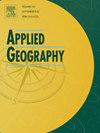感知和计算的生态系统服务对居民的人类福祉有不同的影响吗?——以官厅水库盆地为例
IF 5.4
2区 地球科学
Q1 GEOGRAPHY
引用次数: 0
摘要
了解生态系统服务与人类福祉之间的关系对可持续发展至关重要。然而,ES通常以居民感知或模型测量的角度进行量化,这是否会导致其与人类福祉关系的差异尚不清楚。通过整合生物物理模型和住户调查,我们使用偏最小二乘结构方程建模(PLS-SEM)的方法来比较感知(基于居民的)和计算(基于模型的)生态系统对中国关亭水库盆地人类福祉的影响。结果显示,在这两个方面,提供服务一致地提高了人类福祉,影响系数在0.134至0.222之间。由于居民的看法与计算ES的结果相矛盾,在调节、支持和文化服务之间的路径出现了差异。这些差异突出了社会文化叙事与生物物理现实形成的公众认知之间的差距,并强调了在评估生态系统时需要采用多视角方法,以与居民的福祉保持一致。本文章由计算机程序翻译,如有差异,请以英文原文为准。
Do perceived and calculated ecosystem services affect residents’ human well-being differently? ——A comparison study in the Guanting Reservoir basin, China
Understanding the relationship between ecosystem services (ES) and human well-being is critical for sustainable development. However, ES are often quantified in either resident-perceived or model-measured perspective, whether this would cause a difference in its relationship with human well-being is poorly understood. By integrating biophysical models and household surveys, we used the method of Partial Least Squares Structural Equation Modeling (PLS-SEM) to compare how perceived (resident-based) and calculated (model-based) ES influence human well-being in China’s Guanting Reservoir basin. Results revealed that provisioning services consistently enhanced human well-being in both perspectives, with influence coefficients ranging from 0.134 to 0.222. Discrepancies emerged in pathways among regulating, supporting, and cultural services, as residents’ perceptions contradicted the results derived from calculated ES. These differences highlight the gap between public perception shaped by socio-cultural narratives and biophysical realities, and emphasize the need for multi-perspective approaches in the valuation of ES to align with residents’ well-being.
求助全文
通过发布文献求助,成功后即可免费获取论文全文。
去求助
来源期刊

Applied Geography
GEOGRAPHY-
CiteScore
8.00
自引率
2.00%
发文量
134
期刊介绍:
Applied Geography is a journal devoted to the publication of research which utilizes geographic approaches (human, physical, nature-society and GIScience) to resolve human problems that have a spatial dimension. These problems may be related to the assessment, management and allocation of the world physical and/or human resources. The underlying rationale of the journal is that only through a clear understanding of the relevant societal, physical, and coupled natural-humans systems can we resolve such problems. Papers are invited on any theme involving the application of geographical theory and methodology in the resolution of human problems.
 求助内容:
求助内容: 应助结果提醒方式:
应助结果提醒方式:


